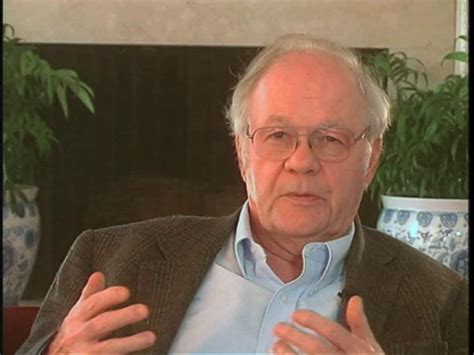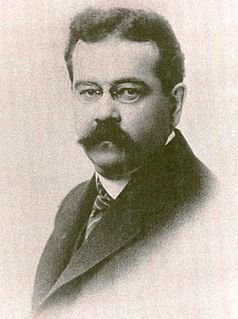Top 1200 Moral Growth Quotes & Sayings - Page 15
Explore popular Moral Growth quotes.
Last updated on December 12, 2024.
I would say to anybody who thinks that all the problems in philosophy can be translated into empirically verifiable answers - whether it be a Lawrence Krauss thinking that physics is rendering philosophy obsolete or a Sam Harris thinking that neuroscience is rendering moral philosophy obsolete - that it takes an awful lot of philosophy - philosophy of science in the first case, moral philosophy in the second - even to demonstrate the relevance of these empirical sciences.
I think I would rather live on the verge of falling and let my security be in the all-sufficiency of the grace of God than to live in some pietistic illusion of moral excellence. Not that I don't want to be morally excellent but my faith isn't in the idea that I'm more moral than anybody else. My faith is in the idea that God and His love are greater than whatever sins any of us commit.
It is true (independently of our conceptualisation) that it is wrong to inflict pain on a sentient creature for no reason (she doesn't deserve it, I haven't promised to do it, it is not helpful to this creature or to anyone else if I do it, and so forth). But if this is a truth, existing independently of our conceptualisation, then at least one moral fact (this one) exists and moral realism is true. We have to accept this, I submit, unless we can find strong reasons to think otherwise.
Lastly, our ancestors established their system of government on morality and religious sentiment. Moral habits, they believed, cannot safely be trusted on any other foundation than religious principle, nor any government be secure which is not supported by moral habits.... Whatever makes men good Christians, makes them good citizens.
The time has also come to recognize the painful truth that traditional Judeo-Christian moral values of pain and pleasure in human relationships have contributed substantially to child abuse and to the prevalence of physical violence in Western civilization.... The religious system upon which our culture is based holds that pain, suffering and deprivation are moral and necessary to save one's soul and make one a 'good person.' The crucifixion and scourging of Christ are examples.
The Zen meditative approach has a simple, unstated premise: moods and attitudes shape—determine—what we think and perceive. If we feel happy, we tend to develop certain trains of thought. If we feel sad or angry, still others. But suppose, with training, we become nonattached to distractions and learn to dampen these wild, emotional swings on either side of equanimity. Then we can enter that serene awareness which is the natural soil for positive, spontaneous personal growth, often called spiritual growth.
[Prudence] is the virtue of that part of the intellect [the calculative] to which it belongs; and . . . our choice of actions will not be right without Prudence any more than without Moral Virtue, since, while Moral Virtue enables us to achieve the end, Prudence makes us adopt the right means to the end.
Education spurs growth and unlocks potential. After all, a single year of primary education creates a 10 to 20 percent increase in a woman's wages later in life. Education lowers the risk of disease and decreases the likelihood that a child will fall into violence and crime. And a child born to a literate mother is 50 percent more likely to survive past age five. No country has achieved sustained growth without at least 40 percent literacy for its adults.
Now, in economic crises times, the kind of things you're looking at is it's generally harder to get capital, revenue growth may be more, revenue lines may be unstable or growth may be less easy to predict that you're going to get to. And so what you do is you take a certain conservative approach of when, as all entrepreneurs should do, you plan for both good luck and bad luck, you put extra time on, "Okay, if I have bad luck, what do I do about that?"
There is a moral virtue, a moral fidelity, ability and honesty, which other men, besides church members, are, by good nature and education, by good laws and good examples nourished and trained up in; so that civil places and trust and credit need not be monopolized into the hands of church members (who sometimes are not fitted for public office), while all others are deprived and despoiled of their natural and civil rights and liberties.
The insistence on truthfulness does not disturb the freedom of the individual. The social obligation implied in Satyagraha turns the freedom of the individual into moral freedom. An atheist is free to say or to do what he likes, provided he does what he says and says what he does. So, in the context of social relations, the freedom of the individual is moral freedom.
The concept of absolute, hence (or whence) springs, in the moral field, the moral laws or norms, represent, in the field of knowledge, the principle of identity, which is the fundamental law of the thought; norms of logic springs from it, that govern the thought (or mind) in the field of science." ("Le concept de l'absolu, d'où découlent, dans le domaine moral, les lois ou normes morales, constitue, le principe d'identité, qui est la loi fondamentale de la pensée; il en découle les normes logiques qui régissent la pensée dans le domaine de la science.")
For God to be kept out of the classroom or out of America's public debate by nervous school administrators or overcautious politicians serves no one's interests. That restriction prevents people from drawing on this country's rich and diverse religious heritage for guidance, and it degrades the nation's moral discourse by placing a whole realm of theological reasoning out of bounds. The price of that sort of quarantine, at a time of moral dislocation, is - and has been - far too high.
Really great moral teachers never do introduce new moralities: it is quacks and cranks who do that.... The real job of every moral teacher is to keep on bringing us back, time after time, to the old simple principles which we are all so anxious not to see; like bringing a horse back and back to the fence it has refused to jump or bringing a child back and back to the bit in its lesson that it wants to shirk.
I know that every difficulty we face in life, even those that come from our own negligence or even transgression, can be turned by the Lord into growth experiences, a virtual ladder upward. I certainly do not recommend transgression as a path to growth. It is painful, difficult, and so totally unnecessary. It is far wiser and so much easier to move forward in righteousness. But through proper repentance, faith in the Lord Jesus Christ, and obedience to His commandments, even the disappointment that comes from transgression can be converted into a return to happiness.
If there is no struggle, there is no progress. Those who profess to favor freedom, and yet depreciate agitation, are men who want crops without plowing up the ground. They want rain without thunder and lightning. They want the ocean without the awful roar of its many waters. This struggle may be a moral one; or it may be a physical one; or it may be both moral and physical; but it must be a struggle.
With apologies to the green movement, "sustainability" is a myth. History and archaeology show that societies are always moving to the edge of crisis, "falling forward" through growth, but then responding often successfully to the problems created. What we can hope for is that with a somewhat more controlled level of growth, and with longer-term preparations for change, we can keep responding to the inevitable smaller crises, as they arise, and continue to postpone until later and later the, perhaps ultimately inevitable, end of our civilization.
At the center of the Christian faith is the affirmation that there is a God in the universe who is the ground and essence of all reality. A Being of infinite love and boundless power, God is the creator, sustainer, and conserver of values....In contrast to the ethical relativism of [totalitarianism], Christianity sets forth a system of absolute moral values and affirms that God has placed within the very structure of this universe certain moral principles that are fixed and immutable.
How does something immoral, when done privately, become moral when it is done collectively? Furthermore, does legality establish morality? Slavery was legal; apartheid is legal; Stalinist, Nazi, and Maoist purges were legal. Clearly, the fact of legality does not justify these crimes. Legality, alone, cannot be the talisman of moral people.
Successful or not, acts of physical courage always bring honor. It is the smaller forms of valor - standing up for principle at the risk of social disapproval, economic loss or injury to career - that require the greatest moral will power. Since there is usually little upside to winning and a significant and often lasting downside to losing, moral courage often requires as much character as physical bravery.
Their usual mistaken premise is that they affirm some consensus among people, at least among tame peoples, concerning certain moral principles, and then conclude that these principles must be unconditionally binding also for you and me-or conversely, they see that among different peoples moral valuations are necessarily different and infer from this that no morality is binding-both of which are equally childish.
While I think in principle people should not have irrational beliefs, I should say that as a matter of fact, it is people who hold what I regard as completely irrational beliefs who are among the most effective moral actors in the world, in many respects. They're among the worst, but also among the best, even though the moral beliefs are ostensibly the same.
And so was Luria, whose words now came back to me: ‘A man does not consist of memory alone. He has feeling, will, sensibility, moral being ... It is here ... you may touch him, and see a profound change.’ Memory, mental activity, mind alone, could not hold him; but moral attention and action could hold him completely.
I feel like we're between two great possibilities: we're either going to turn things around, and in this generation see the rising sun of a new moral dedication in America, or we're going to lose the struggle for that moral renewal, throw away the basic principles on which our life and civilization is based, and head toward a new century that will make the 20th century look like a dress rehearsal for evil.
The reason I love travel is not just because it transports you in every sense, but because it confronts you with emotional and moral challenges that you would never have to confront at home. So I like going out in search of moral and emotional adventure which throws me back upon myself and forces me to reconsider my assumptions and the things I took for granted. It sends me back a different person.
The impact of QE on generating more lending by Wall Street to Main Street and in generating more employment and increasing overall investment in the economy is quite modest. QE probably limited the initial collapse of the economy in 2008, and likely had a very small positive impact on economic growth, but its broader impact on jobs and growth in the economy seems not very big.
All human beings are moral beings. So, certainly there are alliances. We are in the countries, that are secular states, and we obey its laws. I think we must recognize that common moral base. But in alliances we must always be careful just of what level the alliance is perceived. I will go and lecture to an atheist society, for example, but I will not lecture for them, because I am not an atheist. You see the difference.
If we can get to that 3 percent grow, it is $2 trillion to $2.5 trillion worth of more government revenues. It's 12 million additional jobs. And those are 12 million jobs paying into Medicare, 12 million jobs paying into Social Security. Growth really is what's driving all of this and growth is what our focus is, which is why we're willing to accept increased short-term deficits in exchange for that long-term payoff.
Market forces have no intrinsically moral direction, which is why, before he wrote The Wealth of Nations, Adam Smith wrote The Theory of Moral Sentiments. Ethics should precede economics. But it doesn't have to. . . . We know this because we've seen the results of capitalism without conscience: the pollution of the air we breathe, the water we drink, and the food we eat; the endangerment of workers; and the sale of dangerous products - from cars to toys to drugs. All in pursuit of ever-greater profits.
Man, no doubt, owes many other moral duties to his fellow men; such as to feed the hungry, clothe the naked, shelter the homeless, care for the sick, protect the defenseless, assist the weak, and enlighten the ignorant. But these are simply moral duties, of which each man must be his own judge, in each particular case, as to whether, and how, and how far, he can, or will perform them.
The very idea of freedom presupposes some objective moral law which overarches rulers and ruled alike. Subjectivism about moral values is eternally incompatible with democracy. We and our rulers are of one kind only so long as we are subject to one law. But if there is no Law of Nature, the ethos of any society is the creation of its rulers, educators and conditioners; and every creator stands above and outside his own creation.
The government must nurture an eco-system where the economy is primed for growth; and growth promotes all-rounddevelopment. Where development is employment-generating ; and employment is enabled by skills. Where skills are synced with production; and production is benchmarked to quality. Where quality meets global standards; and meeting global standards drives prosperity. Most importantly, this prosperity is for the welfare of all. That is my concept ofeconomic good governance and all round development.
Consumerism is, quite precisely, the consuming of life by the things consumed. It is living in a manner that is measured by having rather than being... and consumerism is hardly the sin of the rich. The poor, driven by discontent and envy, may be as consumed by what they do not have as the rich are consumed by what they do have. The question is not, certainly not most importantly, a question about economics. It is first and foremost a cultural and moral problem requiring a cultural and moral remedy.
The moral justification of capitalism does not lie in the altruist claim that it represents the best way to achieve 'the common good.' It is true that capitalism does -- if that catch-phrase has any meaning -- but this is merely a secondary consequence. The moral justification for capitalism lies in the fact that it is the only system consonant with man's rational nature, that it protects man's survival qua man, and that its ruling principle is: justice
Since my moral system rests on my accepted version of the facts, he who denies my moral judgments or my version of the facts, is to me perverse, alien, dangerous. How shall I account for him? The opponent has always to be explained, and the last explanation that we ever look for is that he sees a different set of facts. Such an explanation we avoid, because it saps the very foundation of our own assurance that we have seen life steadily and seen it whole.
There is so much closed-mindedness, there is so much closed-off thought, there is so much bigotry and prejudice within knowledge that it, I think, is stunting the actual intelligence growth of our population. Not our capabilities but our actual intelligence growth because all of the stigma that's attached to people that don't have formal educations as opposed to those who do. But the people that have formal educations have been programmed and indoctrinated in many cases, not in all the disciplines.
Virtually throughout its history, and certainly in the 20th century, California has been known as the place to go for dynamism and growth. It did not become the richest, most populous, and most productive state solely because of its weather and natural resources. So it takes a lot to turn California around from growth to contraction, from people moving into the state to a net exodus from the state, from business moving into California to businesses leaving California. It takes some doing. And the Left has done it.
To change our national economic story from one of financial speculation to one of future growth, we need a third industrial revolution: a green revolution. It will transform our economy as surely as the shift from iron to steel, from steam to oil. It will lead us toward a low-carbon future, with cleaner energy and greener growth. With an economy that is built to last - on more sustainable, more stable foundations
Ideally, you will develop strategic response to your place in the corporate lifecycle to identify new paths of strategic renewal. You will look for new growth curves that can be started early enough to replace declining products and you will try to identify whole new curves that will take the organisation to new levels of growth as a whole.
Success is when the whole gets enlightened. When you become one with the whole, that's the real success. To be one with the whole is the real success. And when that success is achieved, then you really enjoy that growth - that growth of your awareness which makes you one with the whole. That is what you have to know, is to become your whole. You are just a fragment, a segment, a cell. You have to become the whole and that can be done only through this connection.
The greatest economic minds of the 19th century, all of them without exception, considered economic growth as a temporary necessity. When all human needs are satisfied, then we will have a stable economy, reproducing every year the same things. We will stop straining ourselves worrying about development or growth. How naïve they were! One more reason to be reluctant about predicting the future. No doubt they were wiser than me, but even they made such a mistake!
I'm not expecting a big sell-off but I do think that if we don't have a move toward economic growth and policies that will promote economic growth and get us out of this 2 percent world - we really need to see 4 percent, 5 percent - to see jobs created, and if we don't see that longer-term, yeah the market will sell-off...[but] I do think things are getting better. It's just been very slow.
... For all our alarm, it is clear that the religious right is responding to a real hunger in our society... a deep-seated yearning for stable values... When conservative Christian groups talk of failures in our educational system, the erosion of our moral standards, and the waste of young lives, they are addressing real and legitimate concerns... Among secularists, the aversion toward discussion of moral values, let alone religion, can reach absurd extremes.
Indiscriminate tolerance and indiscriminate condemnation are not two opposites: they are two variants of the same evasion. To declare that “everybody is white” or “everybody is black” or “everybody is neither white nor black, but gray,” is not a moral judgment, but an escape from the responsibility of moral judgment.
For nearly a century, the moral relativism of science has given faith-based religion--that great engine of ignorance and bigotry--a nearly uncontested claim to being the only universal framework for moral wisdom. As a result, the most powerful societies on early spend their time debating issues like gay marriage when they should be focused on problems like nuclear proliferation, genocide, energy security, climate change, poverty, and failing schools.
If only you could see the whole picture, if you knew the whole story, you would realize that no problem ever comes to you that does not have a purpose in your life, that cannot contribute to your inner growth. When you perceive this, you will recognize that problems are opportunities in disguise. If you did not face problems, you would just drift through life. It is through solving problems in accordance with the highest light we have that inner growth is attained.
The desire for guidance, love, and support prompts men to form the social or moral conception of God. This is the God of Providence, who protects, disposes, rewards, and punishes; the God who, according to the limits of the believer's outlook, loves and cherishes the life of the tribe or of the human race, or even of life itself; the comforter in sorrow and unsatisfied longing; he who preserves the souls of the dead. This is the social or moral conception of God.
While some animals exhibit individual powers in higher perfection, man stands for their superior, not only in combining in his own body all the senses and faculties which they possess, but in being endowed with moral and intellectual powers which are denied to them, and which at once place him at the head of the living creation, and constitute him a moral, religious, intelligent, and responsible being.
The steep ride up the and down the energy curve is the most abnormal thing that has ever happened in human history. Most of human history is a no-growth situation. Our culture is built on growth and that phase of human history is almost over and we are not prepared for it. Our biggest problem is not the end of our resources. That will be gradual. Our biggest problem is a cultural problem. We don't know how to cope with it.
If human thought is a growth, like all other growths, its logic is without foundation of its own, and is only the adjusting constructiveness of all other growing things. A tree cannot find out, as it were, how to blossom, until comes blossom-time. A social growth cannot find out the use of steam engines, until comes steam-engine-time.
First the stalk — then the roots. First the need — then the means to satisfy that need . First the nucleus — then the elements needed for its growth. The seed is a primary cause. The need, the nucleus, both are primary causes. Conditions — they are secondary. Given enough life in the nucleus, it will draw to itself the necessary means for growth regardless of conditions.
The moral authority in the Western world is gone. And it is gone forever. It is gone, not because of the criminal record--everybody's record is criminal. It is gone because you cannot do one thing and pretend you're doing another! None of us, who are sitting around in some of the true limbo out-of-space, which we call "now," waiting to be saved, civilized, or discovered, have the moral authority to say anything.
























































